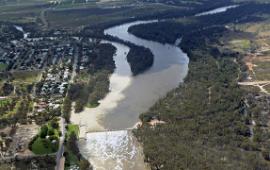Accounting for unchartered waters

In Summary
This article featured in Swinburne’s ‘Research Impact’ magazine, produced in association with Nature Publishing Group.
The use of water from the huge Murray-Darling River Basin in eastern Australia remains a contentious issue after more than a decade of legal wrangling, policies and plans. But, there is a stronger consensus about how much water the basin actually contains, thanks to an emerging discipline called water accounting, developed by a team including a Swinburne researcher.
Professor Keryn Chalmers, Dean of Swinburne Business School, was part of a team of financial accountants who developed a conceptual framework for general-purpose water accounting that informed Australian Water Accounting Standards.
These standards are final and available for voluntary adoption by industry and government and important to water reform.
Every drop, including rainfall, evapotranspiration, surface and ground water is counted. The information will guide the Council of Australian Governments when it meets in 2017 to decide how much water is required to maintain river flows.
“The goal was to create a useful reporting system to inform decision-makers about water resources, including allocations,” said Chalmers. In an audit of existing water reporting pro-cesses the researchers found a patchwork of methods in which some water users were not considered.
Chalmers’ team established a collaborative process involving hydrologists, engineers, water–users and policy–makers. The outcome was a rigorous method to report water stocks and flows.
“The concept is really similar to general-purpose financial accounts; you have a balance sheet that identifies water assets and liabilities,” said Chalmers.
The Bureau of Meteorology now publishes its annual National Water Account for the ten nationally significant water regions in Australia, including the Murray–Darling River Basin using the principles of general-purpose water reporting.
The approach has had an influence globally as well, with the team’s ideas con-tributing to an emerging international discipline of water accounting.
Water accounting methods will be integral as society is forced to manage its water resources more carefully.

